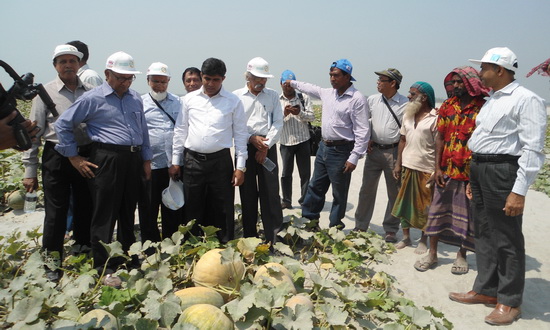
Scientists Promote Char Land Agri and Biotech for Northern Districts of Bangladesh
April 23, 2014| |
Bangladesh Biotechnology Information Centre (BdBIC), Shobuj Bangladesh 24, Practical Action, RDRS and Helvetas organized a 2-day consultation meeting at Rangpur District on 11-12 April 2014. Professor Dr. M. Shahiduzzaman, Chief Editor of Shobuj Bangladesh 24, has chaired the seminar where around 100 scientists, university professors, NGO and private industry experts, farmers and journalists have attended and contributed to char land livelihood improvement.
Professor Dr. M.A. Sattar Mondal, the former Vice Chancellor of Bangladesh Agricultural University (BAU) and former member of Planning Commission of Bangladesh in his speech as the guest of honor has suggested that the perennial monga (Bengali term for poverty and hunger) of river devouring poor northern districts of Bangladesh can be mitigated through char land agriculture where the farmers are producing pumpkin with the support of NGOs. He also endorsed the use of biotechnology because of the increasing popularity of maize on char land and sandy soil of northern region. This practice can be modernized with mechanization and the introduction of Bt maize and drought resistant maize for cost reduction on spraying and safeguarding the environment. Professor Dr. Shankar K. Raha, Dean, Faculty of Agricultural Economics & Rural Sociology and Professor Dr. M.A. Sattar, Dean, Faculty of Agriculture, BAU were among the 7 professors who have contributed their technical and practical experiences on how char land agriculture can be shaped for mitigation of monga in the northern districts through modernization of sustainable agricultural system. The NGO experts have shared their strategies and experiences working with the resource poor marginal farmers.
Part of the program was a farm visit and consultation with farmers in char lands.
| |
Biotech Updates is a weekly newsletter of ISAAA, a not-for-profit organization. It is distributed for free to over 22,000 subscribers worldwide to inform them about the key developments in biosciences, especially in biotechnology. Your support will help us in our mission to feed the world with knowledge. You can help by donating as little as $10.
-
See more articles:
-
News from Around the World
- BioVision Alexandria Panel Commemorates Borlaug's Legacy
- Experts Answer Top Consumer Questions About GMOs
- AfricaRice Project to Harness Resilient Traits from African Rice
- Minister Calls for Collaboration Between Biotech Experts and the Media in Tanzania
- Nanosensors to Help Visualize Movements and Distribution of Plant Stress Hormone
- Light Sensing Gene from Hornwort Transferred to Ferns Naturally
- Scientists Promote Char Land Agri and Biotech for Northern Districts of Bangladesh
- Experts Advocate Biotech to Combat Food Scarcity and Poverty in Bangladesh
- Medicinal Plant Swertia Goes In vitro
- Defra Approves Field Trials for GM Camelina
- Major Breakthrough in Understanding Plant Disease Resistance
- EFSA Releases Infographic on Risk Assessment
- Dutch Government Reveals Biotech Policy
-
Research Highlights
- Overexpression of Peroxiredoxin Q Enhances Abiotic Stress Tolerance in Lisianthus
- Soybean Gets New Defense Against Soybean Cyst Nematodes
- DOG1-like Gene Overexpression Provide Control of Seed Dormancy in Cereals
-
Beyond Crop Biotech
- Trees Engineered to Break Down Easily for Paper, Biofuel Production
- Shrimps Now Take Oral Medicine for Yellow-Head Virus
- GM Bacterium Features Increased Acetate Production
-
Read the latest: - Biotech Updates (February 18, 2026)
- Gene Editing Supplement (January 28, 2026)
- Gene Drive Supplement (February 22, 2023)
-
Subscribe to BU: - Share
- Tweet

